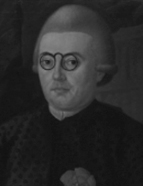

António Ribeiro dos Santos was the son of a mining colonel, grandson and nephew of merchants working in Rio de Janeiro, where he moved in 1756. He accompanied his uncle Gonçalo Ribeiro dos Santos on his return to Portugal in 1764. This relative of his, who settled in Lisbon, in Rua de S. Domingos, was Director of the Board of Administration of the Funds of the Company of Pernambuco and Paraíba. He therefore lived very closely with the Pombaline bourgeoisie and even dedicated his doctoral theses to Joaquim Inácio da Cruz. He studied humanities (Latin, Greek, philosophy and rhetoric) at the Seminary of Nossa Senhora da Lapa in Rio de Janeiro, where his teachers were former Jesuits. He attended the Canon Law Course at the University of Coimbra, taking his Instituta exams in 1763. He obtained his bachelor’s degree in 1768 and his master’s and doctorate in 1771. An opponent of the Faculdade de Direito Canónico [School of Canon Law] at the University of Coimbra, he was substitute lecturer of the First Synthetic Canon Law between 1779 and 1789, a teaching position to which he returned in 1795. He also held the Second Chair of Synthetic Canon Law (1790-1795). He retired in 1795.
António Ribeiro dos Santos held various positions and dignities throughout his life: University Librarian (1777), Ordinary Judge of the Casa da Suplicação (1789), Commissioner-General for Studies in the Court and Province of Estremadura (1790), Knight of the Order of Christ (1790), Canon of the Cathedral of Viseu (1792), Deputy of the Holy Office (1793), Chronicler of the House of Bragança (1795), Royal Censor (1795), Deputy of the Board of the House of Bragança (1797), Doctoral Canon of the Cathedral of Faro (1800), Deputy of the Board of the General Directorate of Minor Studies (1800), Deputy of the Board of the Organisation of the Military Penal Code (1802), Deputy of the Board of Conscience and Orders (1802), Canon of the Metropolitan Cathedral of Évora (1804), Chief Librarian of the Royal Public Library (1804) and Deputy of the Board of the Bull of the Crusade (1809).
This work is financed by national funds through FCT - Foundation for Science and Technology, I.P, in the scope of the projects UIDB/04311/2020 and UIDP/04311/2020.
